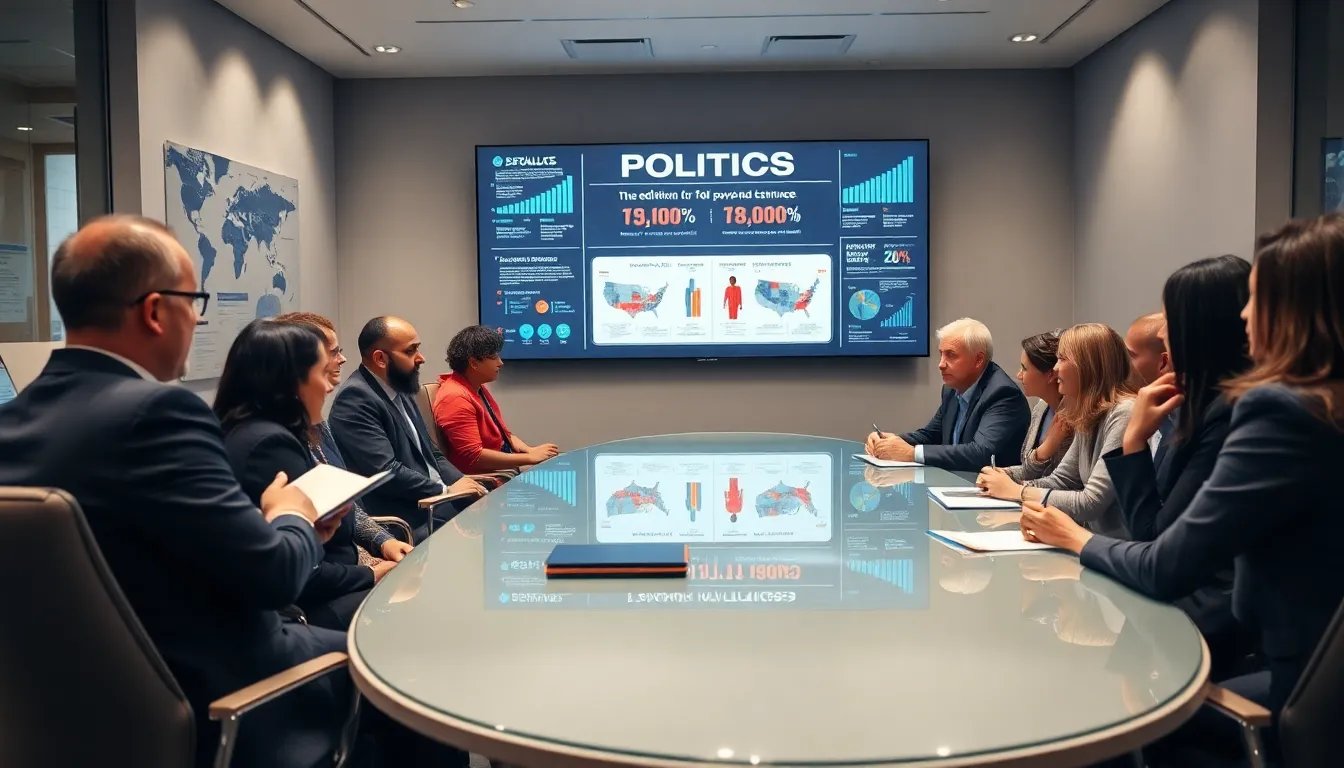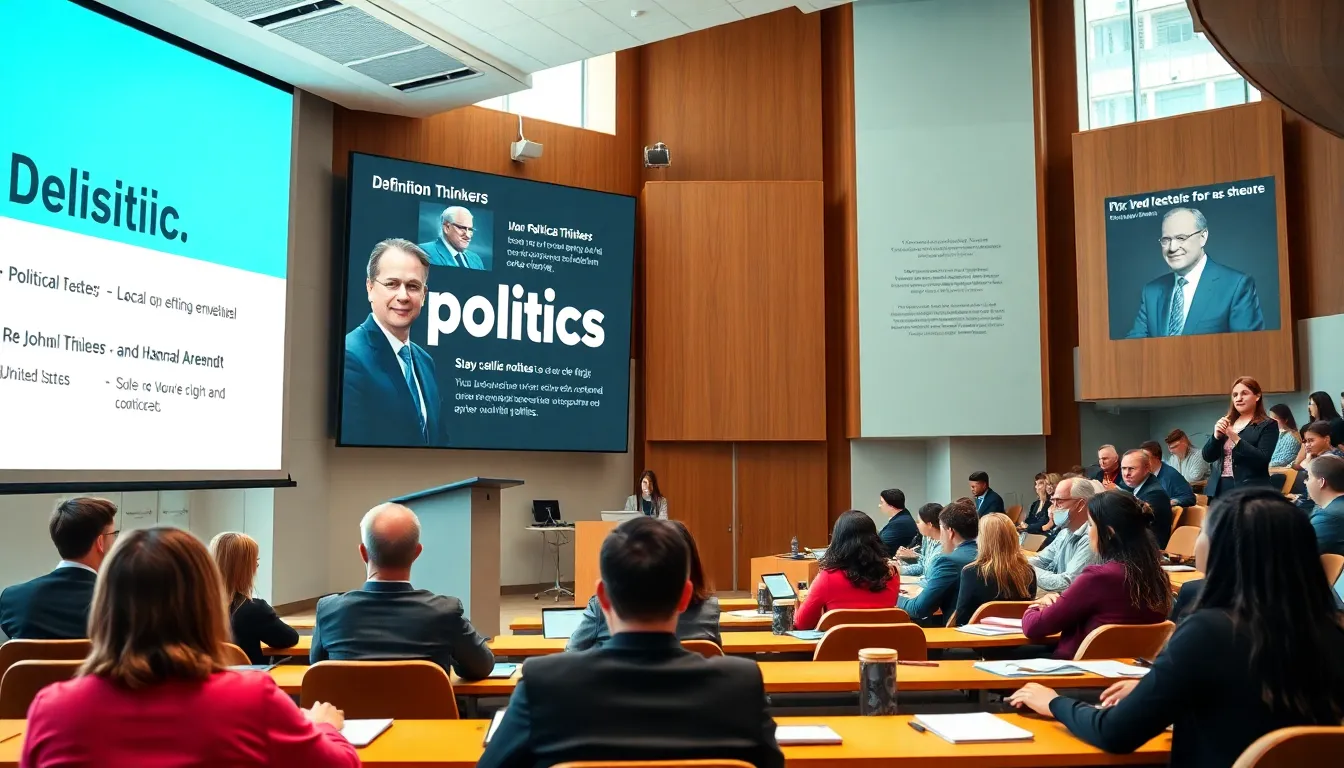Politics is a word that often inspires passionate debates, eye-rolls, and even a few awkward family dinners. Yet, even though its ubiquity in our daily conversations, a clear definition can seem as elusive as a politician’s promise. Understanding the origin and evolution of political thought is crucial for grasping the ever-changing landscape of governance and power dynamics. So, buckle up. We’re about to jump into the definition of politics according to scholars, blending insight with a touch of humor as we navigate this complex terrain.
Table of Contents
ToggleThe Essence of Politics

At its core, politics is about power and governance. It touches every facet of society, from local communities to global networks. Scholars often highlight that politics isn’t merely a practice or an institution: it’s a dynamic social process that evolves based on cultural values and historical context. As various thinkers have expressed, politics is both a science and an art, reflecting the balance between logic and creativity.
In simpler terms, it’s about how people make decisions together, share resources, and resolve conflicts. Also, it is influenced by ideology, where power struggles often mirror the diverse views that shape human experiences. Politics, hence, is a blend of conflict, negotiation, and cooperation, making it a fascinating subject for both scholars and the general public alike.
Historical Perspectives on Politics
Historically, the understanding of politics has shifted dramatically. Ancient philosophers like Aristotle described politics as the ‘art of the good life,’ emphasizing its ethical dimensions. For him, a well-functioning polis was integral to human flourishing. Fast forward to the Enlightenment era, and thinkers like Hobbes and Locke began to frame politics around the social contract, focusing on individual rights and governance structures.
This evolution continued into the modern age, where theories branched out further. Revisiting these foundational ideas reveals a wealth of perspectives that have shaped our current political systems. Throughout history, political thought has reflected the struggles of societies transitioning from feudalism to democracy, showcasing how context modifies definitions.
Contemporary Scholarly Definitions
In today’s world, there is no shortage of scholars attempting to pin down a universal definition of politics. Contemporary definitions often emphasize the role of power relations and social change. For instance, political scientist David Easton defines politics as the ‘authoritative allocation of values’ in a society, underscoring the centrality of decision-making.
Different Branches of Political Thought
Today, political thought encompasses liberalism, conservatism, socialism, and various critical theories. Each branch carries its own lens through which politics is understood, shaping the definitions provided by scholars.
Influence of Political Theories on Definitions
Political theories also significantly influence how definitions are framed. Scholars within feminist theory may argue that definitions of politics should incorporate gender dynamics, while post-colonial theorists might insist on viewing politics through the lens of historical oppression. These nuances contribute to not only how politics is defined but also to its ongoing evolution.
Key Scholars and Their Contributions
Several eminent figures have made significant contributions to the academic discourse on politics.
- Max Weber, known for his focus on authority and legitimacy, prioritized understanding power structures and their implications. His work clarified the importance of bureaucracy in modern governance.
- John Rawls revolutionized political theory with his concept of justice as fairness, emphasizing socio-economic equity.
- Hannah Arendt offered insights into totalitarianism and power, reminding scholars of the dangers present in political systems.
These scholars are not just names in a textbook: their works continue to shape debates in contemporary politics, reaffirming that definitions of politics are fluid and context-dependent.
Challenges in Defining Politics
Defining politics remains a contentious try. One major challenge is the nuance in language. Different scholars may emphasize distinct aspects based on their ideological commitments or academic traditions. Also, what constitutes ‘politics’ may vary significantly between cultures, raising questions about universal definitions.
Also, the rapid evolution of social media and technology has transformed political interactions and definitions, leading to debates about the relevance of traditional theories in the digital age. Scholars grapple with incorporating these modern dynamics into established definitions, revealing the ongoing struggle to precisely articulate the essence of politics.





